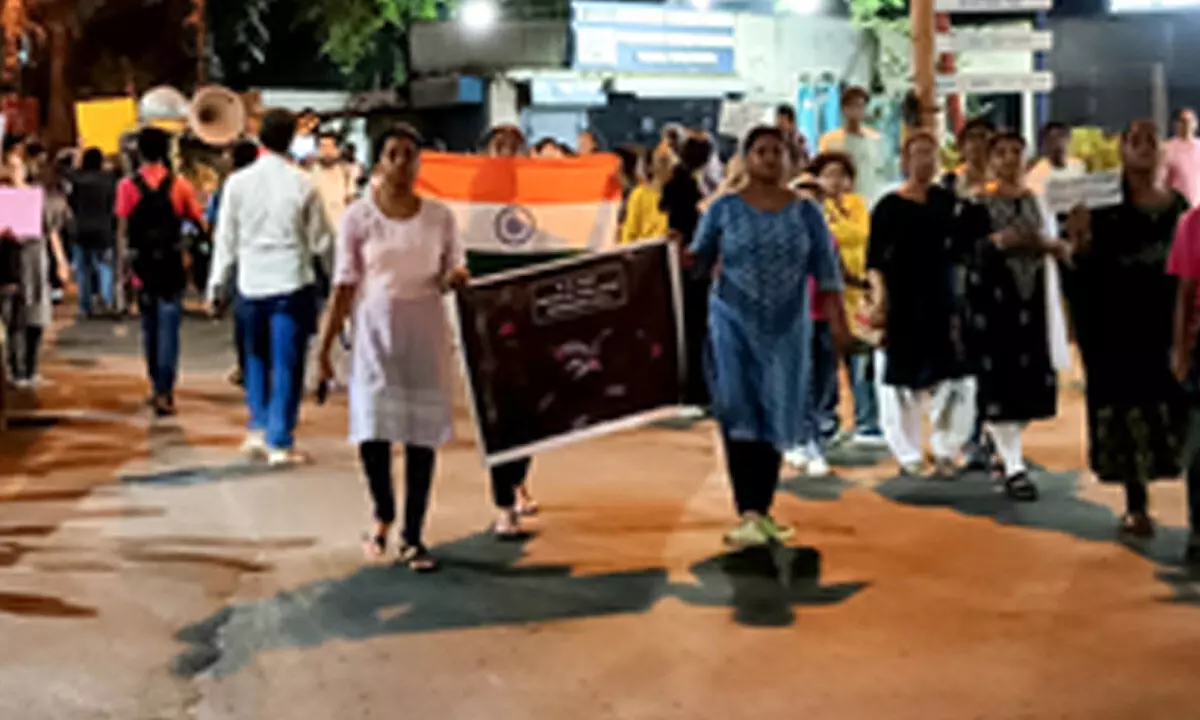Live
- Dy CM directs officials to collect all critical info on caste census
- Naga Chaitanya Opens Up About His Wedding Plans with Sobhita Dhulipala
- ‘NC24’ First Look Poster: Naga Chaitanya’s Next Promises Thrills and Mythology
- Rumors Heat Up as Vijay and Rashmika Enjoy a Cozy Meal Together
- 67th annual day celebrations held at IRISET
- Actor Ali Receives Legal Notice Over Unauthorized Construction at Vikarabad Farmhouse
- Puspa 2 -The Rule: Allu Arjun and Sreeleela Set the Stage on Fire with 'Kissik' Song
- Odisha promotes ‘Karuna silk’ at IITF
- Food Poisoning in Hyderabad: Three Fall Ill After Eating Biryani from Aroma Restaurant
- Meet held on reducing GHG emissions
Just In
March to Secretariat: SC hasn’t restricted police from enforcing legal provisions, says Bengal ADGP

In the wake of the March to Secretariat ('Nabanna Abhijan') call given by the students of West Bengal on Tuesday in protest against the rape and murder of the junior doctor at Kolkata's R.G. Kar Medical College and Hospital, a senior official of the state police, on Monday, claimed that the Supreme Court has not barred the police authorities from enforcing legal provisions.
Kolkata: In the wake of the March to Secretariat ('Nabanna Abhijan') call given by the students of West Bengal on Tuesday in protest against the rape and murder of the junior doctor at Kolkata's R.G. Kar Medical College and Hospital, a senior official of the state police, on Monday, claimed that the Supreme Court has not barred the police authorities from enforcing legal provisions.
“Misconceptions are being spread in the social media regarding restrictions on police about handling protests on R.G. Kar issue. The apex court has observed that any peaceful protest on the issue cannot be stopped forcefully. But at the same time the apex court has also clarified that the state administration has no restriction on enforcing legal provisions,” said Supratim Sarkar, additional director general of police, South Bengal.
According to him, Section 163 of the newly-enacted Bharatiya Nagarik Suraksha Sanhita (BNSS), which was Section 144 in the earlier Code for Criminal Procedure (CRPC), is enforced near the state secretariat, Nabanna being the VVIP zone, which bars assembly of more than five persons at a time.
“So under this legal provision, assembly and protests at the state secretariat cannot be allowed,” Sarkar explained.
He also explained that the proposed protest march on Tuesday is totally “illegal” since no prior police permission was sought for that as per protocol. “Those who have given a call for the protest have just given the call through social media and through a media interaction. Even the state police as well as the Howrah Police Commissionerate authorities communicated with them and sent letters to them seeking the details of their protest plans so that police arrangements can be made accordingly to ensure peaceful protest. But there had been no reply from them,” Sarkar added.
Meanwhile, the joint forum of state government employees, who had been agitating for a long demanding enhanced dearness allowance (DA) at par with the Union government employees and the arrears accrued on it, has announced their support to Tuesday’s protest march, giving the proposed programme a new dimension.
The West Bengal government had last week approached the Calcutta High Court seeking its intervention in getting a ban on the rally. However, on August 23, a division bench of Calcutta High Court rejected the state government’s plea regarding the same.
Even the Supreme Court, on August 21, observed that while the law would take its course, peaceful protests cannot be stopped forcefully.

© 2024 Hyderabad Media House Limited/The Hans India. All rights reserved. Powered by hocalwire.com






